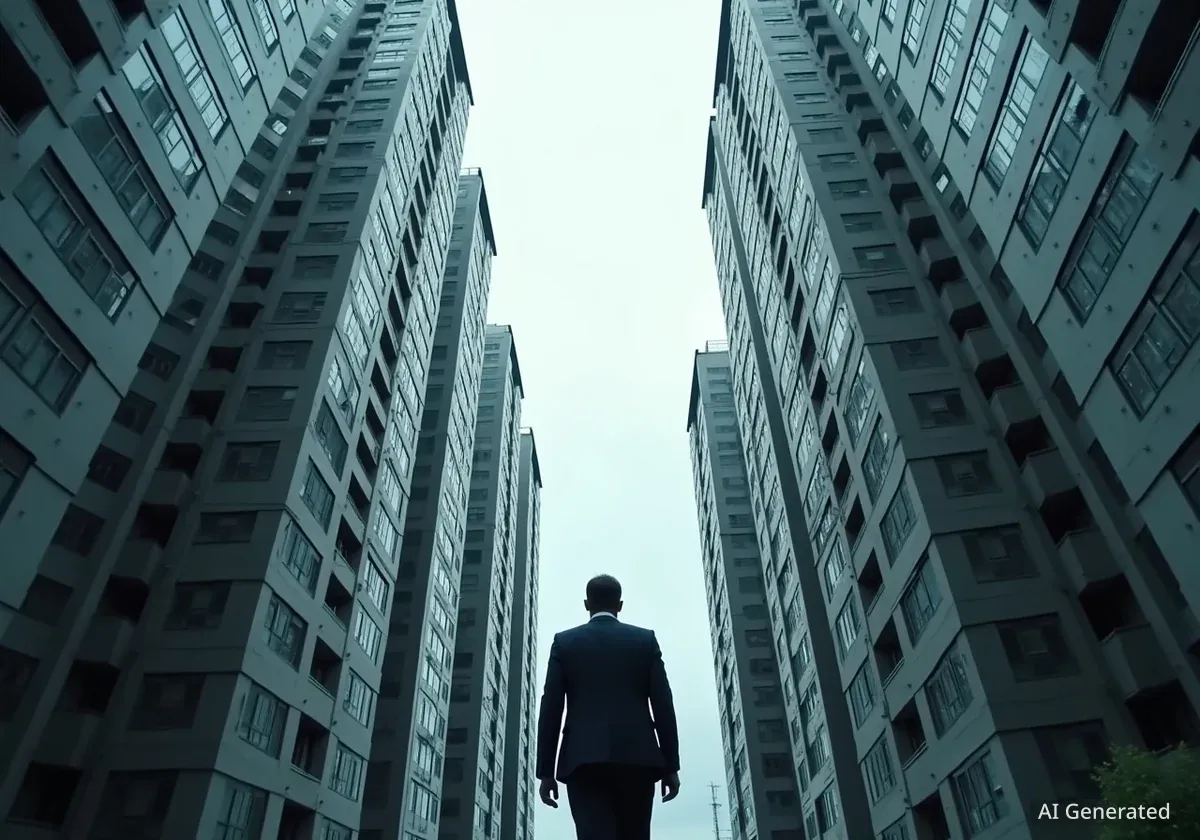Global real estate markets are significantly influenced by political systems, particularly in autocratic nations like China and Russia. In these countries, property is not merely an economic asset; it serves as a crucial tool for government control, political leverage, and wealth preservation. This approach distorts traditional market forces, limits private ownership, and directly links property to state power.
Key Takeaways
- In China, land is state-owned; individuals only receive long-term use rights, typically for 70 years.
- Chinese local governments heavily rely on land sales for revenue, driving aggressive development and speculation.
- Russia technically permits private land ownership, but rights are often insecure and tied to political favor.
- Both nations show weak legal protections for property rights and state dominance over real estate markets.
- Current conditions include a real estate slowdown in China and market suppression in Russia due to sanctions.
China: State Control and Market Dynamics
China's real estate sector operates under extensive state control. This structure deeply impacts ownership, development, and market stability. The government's role is central to how property is acquired and utilized across the nation.
No True Private Land Ownership
In China, the state ultimately owns all land. Individuals and businesses cannot own land outright. Instead, they acquire long-term land-use rights. For residential properties, these rights typically last 70 years. This system creates uncertainty regarding renewal processes and reinforces the government's ultimate authority over all real estate assets.
Fact: Land Use Rights
Chinese citizens hold land-use rights, not direct ownership. These rights are often granted for 70 years for homes. This contrasts sharply with private property ownership models in democratic nations.
Government Relies on Land Sales for Revenue
Local governments across China depend heavily on land sales to fund their operations and development projects. This reliance creates a strong incentive for aggressive urban expansion. It has also led to speculative excess, resulting in phenomena like "ghost cities"—large, newly built urban areas with very few residents—and vast amounts of unused infrastructure.
"Local governments' dependence on land sales creates a strong incentive for rapid, often speculative, development," explained Dr. Li Wei, an economist specializing in Asian markets.
State Intervention Distorts Markets
The Chinese government frequently intervenes in the real estate market. When the market overheats, it imposes restrictions on property purchases, mortgage lending, and pricing. Conversely, during economic downturns, the state injects stimulus into the sector. This makes the market highly sensitive to policy shifts, rather than solely responding to consumer demand.
Economic Context: Policy-Driven Market
China's real estate market is often described as policy-driven. Government decisions on credit, land supply, and purchasing rules have a more direct and immediate impact than in economies where market forces play a larger role.
Current Conditions in China
As of 2025, China faces a significant real estate slowdown. This follows crises involving major developers such as Evergrande and Country Garden, which struggled with immense debt. Autocratic governance allows for massive state interventions, including forced mergers and credit injections to stabilize the sector. However, a lack of transparency, weak legal protections, and reliance on state management continue to undermine investor confidence. This makes the market environment unpredictable for both domestic and international investors.
Russia: Real Estate and Political Influence
In Russia, real estate is deeply intertwined with political power. While private ownership technically exists, its security is often conditional, reflecting the country's autocratic system.
Property Rights with Caveats
Unlike China, Russia formally permits private land ownership. However, property rights in Russia remain insecure under an autocratic system. Assets belonging to businesses or individuals can be seized or invalidated if those owners lose favor with political elites. This risk creates an environment where legal protections are secondary to political standing.
- Formal Ownership: Individuals can own land.
- Informal Risks: Ownership can be challenged or revoked based on political ties.
- Elite Influence: Political favor often dictates property security.
Oligarchic Concentration of Wealth
Much of Russia's luxury and commercial real estate is concentrated in the hands of oligarchs. These individuals often have close ties to the Kremlin. Property frequently functions as a reward for loyalty to the state, a safe haven for wealth, or a tool for political leverage within the elite structure. This concentration limits broader market participation.
Statistic: Wealth Concentration
Reports indicate that a significant portion of high-value Russian real estate is held by a small group of individuals with strong government connections, reflecting deep wealth inequality.
Barriers to Foreign Investment
Foreign investors face substantial hurdles in Russia. International sanctions, widespread corruption, and a weak rule of law discourage external investment. Real estate deals involving foreign entities often require government approval and can be blocked if deemed politically inconvenient. This results in an insular market, heavily influenced by domestic politics rather than global economic trends.
Current Conditions in Russia
The ongoing war in Ukraine and Western sanctions have further suppressed demand in the Russian real estate market, especially from abroad. Domestic markets continue to function, partly supported by government spending. However, affordability for ordinary citizens is eroding due to high inflation and a weakened ruble. Unlike China, which focuses on real estate as a growth engine, Russia's market is shaped more by geopolitics and elite patronage.
Similarities and Differences in Autocratic Real Estate
Both China and Russia share common characteristics in how their autocratic systems influence real estate. Yet, their primary objectives for the sector differ.
Shared Characteristics
Several key similarities define autocratic real estate markets in these two nations:
- Weak Legal Protections: Investors cannot rely on independent courts to safeguard property rights. Judicial decisions are often influenced by state interests.
- State Dominance: Governments use real estate as a primary economic lever or a political tool. This means market outcomes are often dictated from above.
- Distorted Market Forces: Prices, supply, and demand respond less to consumer behavior and more to political agendas and state directives.
Key Differences
Despite similarities, the strategic roles of real estate diverge:
- China: Views real estate as a central engine for economic growth. It uses policy levers to manage cycles of boom and slowdown, aiming for controlled expansion.
- Russia: Primarily treats real estate as a vehicle for elite wealth preservation and geopolitical maneuvering. It is less focused on mass economic expansion through property development.
Conclusion
Autocratic rule in China and Russia ensures that real estate markets prioritize political and state control over free exchange. For ordinary citizens, this means uncertainty regarding ownership rights, vulnerability to rapid policy shifts, and limited legal protection. For investors, it translates into exposure to unpredictable risks, dictated not by market logic but by the will of the state. In democracies, real estate typically reflects consumer demand, supply constraints, and fundamental market principles. However, in autocracies, property ownership and investment are inseparable from politics. China and Russia demonstrate how autocratic governance transforms real estate from a traditional economic sector into an extension of state power. This raises questions about the future of property rights and economic freedom in other nations if similar trends were to emerge.





